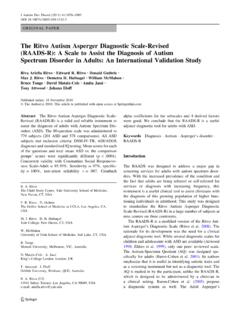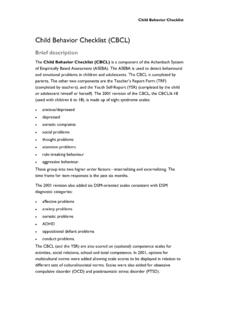Transcription of Anxiety, Self-Efficacy, and College Exam Grades
1 Universal Journal of Educational Research 1(3): 204-208, 2013 DOI: anxiety , Self-Efficacy, and College Exam Grades Jennifer Barrows1, Samantha Dunn1, Carrie A. Lloyd2, * 1 Butler University Conference, April, 2013, in Indianapolis, Huntington University 2 Department of Psychology, Huntington University, 2303 College Avenue, Huntington, IN 46750 *Corresponding Author: Copyright 2013 Horizon Research Publishing All rights reserved. Abstract A student s level of self-efficacy and test anxiety directly impacts their academic success (Abdi, Bageri, Shoghi, Goodarzi, & Hosseinzadeh, 2012; Hassanzadeh, Ebrahimi, & Mahdinejad, 2012). When a student doubts themself and their own ability to test well, the students sole focus becomes worrying about poor Grades and cannot focus on academics (Bandura, 1993).
2 But, little is understood about how test- anxiety and self-efficacy affect short-term success in the classroom. Specifically, how test anxiety and level of self-efficacy directly preceding an exam will affect the exam score. Pre-and post-questionnaires assessing anxiety and self-efficacy immediately before and after a single College exam was completed by 110 College students and exam Grades were obtained from the instructor. Results showed a strong relationship between both test anxiety and exam Grades , and self-efficacy and exam Grades . Further, multiple linear regression analyses showed that exam grade could be predicted by test anxiety and self-efficacy level, and that self-efficacy moderated the effects of anxiety .
3 Keywords College Exams, Test anxiety , College Students, Academic Performance, Self-Efficacy 1. Introduction Test anxiety negatively affects students; more so if the anxiety is dealt with in an unhealthy manner and extends over a long period of time. Hill and Wigfield (1984) approximate that 10 million primary and secondary students test anxiety causes decreased test performance. Test anxiety is a multi-dimensional phenomenon that involves worry, emotionality, and behavioral reply to being preoccupied by the possible negative outcome of academic scores (Chapell, Blanding, Silverstein, Takahashi, Newman, Gubi, & McCann, 2005; Mulkey & O Neil, 1999). Students level of test anxiety can cause a variety of negative outcomes, mainly low academic scores.
4 But, overall self-efficacy may moderate this effect. Test anxiety is detrimental to overall academic success. Chapell et al. (2005) asked 5,551 participants to complete the Test anxiety Inventory (TAI; Spielberger, 1980), report their current cumulative GPA, and complete a self-report scale detailing their Grades (Dornbusch, Ritter, Leiderman, Roberts, & Fraleigh, 1987). The authors found a one-third letter grade difference between undergraduates with high test anxiety and low test anxiety (Chapell et al., 2005). So, in addition to typically discussed measures of academic performance ( , intelligence, capability, study habits), test anxiety also plays a role in whether or not students perform well in academics.
5 Davis et al. (2008) and Pintrich and De Groot (1990) support Chapell et al. s (2005) results. Davis et al. studied 2,215 first-year College students (56% female, 44% male); asking students to complete the Cognitive-Appraising Processing subscales of the Emotional Regulation during Test Taking scale (Schutz et al., 2004) and the Test anxiety scale of the Learning and Study Strategies Inventory (Weinstein et al., 1987). There was a strong correlation between test anxiety and SAT and general quantitative scores. The cluster of students who had high test anxiety had difficulty coping with the stress of the tests which resulted in lower standardized test scores.
6 Pintrich and De Groot s (1990) findings report that test anxiety negatively impacts memory and the ability to retrieve information from memory storage, and thus makes it difficult to retrieve information when needed on exam to correctly answer questions. More recent studies show the same outcome. In the first study, Lang and Lang (2010) studied 219 secondary and vocational school students (122 female, 97 male) and 232 students (132 female, 100 male) secondary students in a second study. Students in the first study completed the Test anxiety Inventory (TAI-G; Hodapp, Laux, & Spielberger, 1982) and in the second study, the students completed a test performance measure in addition to two questionnaires asking about the extent to which they were engaged with the assignment given to them (Rheinberg & Vollmeyer, 2003) and the extent to which they were worrying (Rheinberg & Vollmeyer, 2003).
7 Both groups showed a decrease in test performance, regardless of measure, with increased worry about the test. Similarly, Abdi, Bageri, Shoghi, Goodarzi, & Hosseinzadeh (2012) tested 127 randomly chosen high school students with the Spielberger test anxiety scale . Correlations and regression analyses found a relationship Universal Journal of Educational Research 1(3): 204-208, 2013 205 between test anxiety and overall grade point average. Hassanzadeh, Ebrahimi, and Mahdinejad s (2012) study added to this literature in that the students level of test anxiety can cause the students academic performance to suffer even more depending on the length of time they suffer from test anxiety .
8 These results show that test anxiety inhibit students ability to focus on academics which negatively influences Grades . Worry and emotionality are two different ways that the body naturally responds to test anxiety . Too much worry negatively affects performance, but self-efficacy might moderate this influence. Self-efficacy influences people s belief about their own capabilities, which has been shown to enhance students academic performance (Bandura, 1993; Mulkey & O Neil, 1999). When students are plagued with worry they tend to be distracted or preoccupied with various stressors that burden them, such as the outcome (Cohen et al., 2008; Liebert & Morris, 1967). Thus, it seems reasonable to conclude that students with high self-efficacy would not worry as much about the test results.
9 Mulkey and O Neil (1999) asked 610 males over the age of 18 to take the Novell NetWare examination to determine the effects of their worry and self-efficacy. Individuals who were master s degree students performed well because they stated a belief in their own ability to accomplish the examination given to them, but the opposite was true for most undergraduate students. Abdi et al. (2012) find similar results in their study with high school students. A significant correlation existed between self-efficacy and overall grade points. Regression analyses further showed that self-efficacy could accurately predict academic performance. Emotional responses such as anxiety are the body s physiological response directed by the autonomic nervous system which increases heart rate and sweating in reaction to a stressful situation such as an exam (Cohen et al.)
10 , 2008; Mulkey & O Neil, 1999). Individuals who have high self-efficacy, or confidence in their own skills and abilities, seem to be able to control this physiological response from affecting them negatively (Bandura, 1986, 1997). Empirical evidence also supports the relationship between self-efficacy and test- anxiety and academic achievement within specific academic disciplines. For instance, Yildirim (2012) found that high math self-efficacy is positively related to math achievement and high test- anxiety is negatively related to math achievement. Using Structural Equation Modeling analyzing data of 297 undergraduate engineering students, Hsieh, Sullivan, Sass, and Guerra (2012) found that self-efficacy and test anxiety both predicted students final Grades in a math class.













